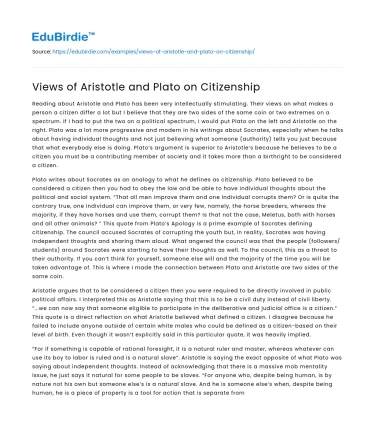Reading about Aristotle and Plato has been very intellectually stimulating. Their views on what makes a person a citizen differ a lot but I believe that they are two sides of the same coin or two extremes on a spectrum. If I had to put the two on a political spectrum, I would put Plato on the left and Aristotle on the right. Plato was a lot more progressive and modern in his writings about Socrates, especially when he talks about having individual thoughts and not just believing what someone (authority) tells you just because that what everybody else is doing. Plato’s argument is superior to Aristotle’s because he believes to be a citizen you must be a contributing member of society and it takes more than a birthright to be considered a citizen.
Plato writes about Socrates as an analogy to what he defines as citizenship. Plato believed to be considered a citizen then you had to obey the law and be able to have individual thoughts about the political and social system. “That all men improve them and one individual corrupts them? Or is quite the contrary true, one individual can improve them, or very few, namely, the horse breeders, whereas the majority, if they have horses and use them, corrupt them? Is that not the case, Meletus, both with horses and all other animals? ” This quote from Plato’s Apology is a prime example of Socrates defining citizenship. The council accused Socrates of corrupting the youth but, in reality, Socrates was having independent thoughts and sharing them aloud. What angered the council was that the people (followers/ students) around Socrates were starting to have their thoughts as well. To the council, this as a threat to their authority. If you can’t think for yourself, someone else will and the majority of the time you will be taken advantage of. This is where I made the connection between Plato and Aristotle are two sides of the same coin.
Aristotle argues that to be considered a citizen then you were required to be directly involved in public political affairs. I interpreted this as Aristotle saying that this is to be a civil duty instead of civil liberty. “...we can now say that someone eligible to participate in the deliberative and judicial office is a citizen.” This quote is a direct reflection on what Aristotle believed what defined a citizen. I disagree because he failed to include anyone outside of certain white males who could be defined as a citizen-based on their level of birth. Even though it wasn’t explicitly said in this particular quote, it was heavily implied.
“For if something is capable of rational foresight, it is a natural ruler and master, whereas whatever can use its boy to labor is ruled and is a natural slave”. Aristotle is saying the exact opposite of what Plato was saying about independent thoughts. Instead of acknowledging that there is a massive mob mentality issue, he just says it natural for some people to be slaves. “For anyone who, despite being human, is by nature not his own but someone else’s is a natural slave. And he is someone else’s when, despite being human, he is a piece of property is a tool for action that is separate from its owner.” Aristotle acknowledges that fact that slaves “may” be human but this in itself is just ethically and morally wrong to say otherwise. He says that slaves “may” be humans; they are human enough to do free labor, and be considered property, but not quite human enough to be considered a citizen. I found this revolting. Nonetheless, this was a common thought in Ancient Greece.
In light of this evidence, I have discovered that Plato’s ideas of citizenship are more appealing because he believes that to be a citizen you must contribute to society. This is still relevant in today's society because people believe that you are a citizen by birthright while others believe that you can be a citizen as long as you contribute to your state. I disagreed with Aristotle because of his beliefs of birthright citizenship does not resonate with me. I agreed with Plato because of his beliefs about contribution making you a citizen is more important to a society’s progression. If we were not debating over what makes a citizen we could live in a more harmonious world.






 Stuck on your essay?
Stuck on your essay?

